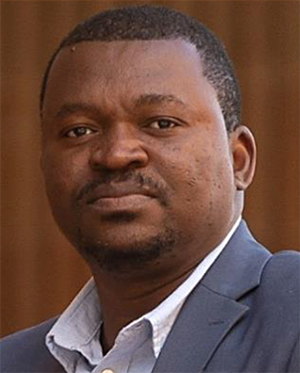College of Human Sciences
Delving deep into the heart of the unique socio-political dynamics of African societies
The College of Human Sciences‘ Transformation Unit recently hosted a thought-provoking seminar titled "The Communal Contract and the African Condition". The event, held at Unisa’s Muckleneuk Campus, brought together scholars, students and intellectuals to delve into the complexities of the communal contract within African societies and its impact on the current state of the continent.

Keynote speaker Prof Jonathan O. Chimakonam
The seminar featured Prof Jonathan O. Chimakonam, a distinguished philosopher and academic, who currently teaches at the University of Pretoria. Chimakonam's expertise spans both the University of Pretoria and the University of Calabar, Nigeria, where he has contributed significantly to the field of African philosophy. His pioneering work revolves around developing novel concepts and frameworks, often employing "Conversational philosophy", "Conversational thinking" and "Ezumezu", a system of logic that bridges various philosophical domains.
In his keynote address, he highlighted the crucial role played by the ancient "communal contract" in shaping the African psyche and socio-political landscape. He introduced the term "communialysis" to encapsulate a psycho-social condition which he argues impedes Africa's progress in the contemporary world. This condition, as outlined in his presentation, manifests in various social and psychological symptoms that hinder societal advancement.
Chimakonam focused on one of these symptoms, namely the prevalent divide between the professed ideals of brotherhood, communalism and ubuntu in African societies and the often discordant reality of behaviour and attitudes. He noted that the tendency of African communities to unite primarily in response to perceived threats, rather than to display positive solidarity and development, reflects a fundamental aspect of the communal contract – negative solidarity.
Chimakonam further explored the roots of communialysis, tracing it back to traumatic historical experiences such as slavery, colonialism, apartheid and neo-colonialism. He argued that these experiences contributed to forming the communal contract, perpetuating a mindset that stifles progress and perpetuates divisive ideologies.
Drawing from his extensive research and analysis, Chimakonam called for a re-examination of the ancient communal contract and its influence on contemporary African societies. He urged a shift towards a new social orientation that encourages positive solidarity and collaborative efforts for development and progress.
The seminar engaged attendees in a stimulating discussion about the implications of Chimakonam's research and the potential for redefining African communalism in a modern context. The event underscored the importance of dealing with historical traumas and ideological legacies to foster a more unified and prosperous Africa.
As the seminar concluded, the participants expressed their appreciation for the thought-provoking insights shared by Chimakonam, and the College of Human Sciences for organising such a thought-provoking event. The exploration of the communal contract and its impact on the African condition left attendees with a renewed sense of purpose and a commitment to driving positive change in their communities and beyond.
* By Tebogo Mahlaela, Communication and Marketing Specialist, College of Human Sciences
Publish date: 2023/09/04

 Unisa co-hosts G20 community outreach in the Eastern Cape
Unisa co-hosts G20 community outreach in the Eastern Cape
 Unisans gain membership of prestigious science academies
Unisans gain membership of prestigious science academies
 Advocating for disability transformation through servant leadership
Advocating for disability transformation through servant leadership
 Unisa Press continues to illuminate the publishing space
Unisa Press continues to illuminate the publishing space